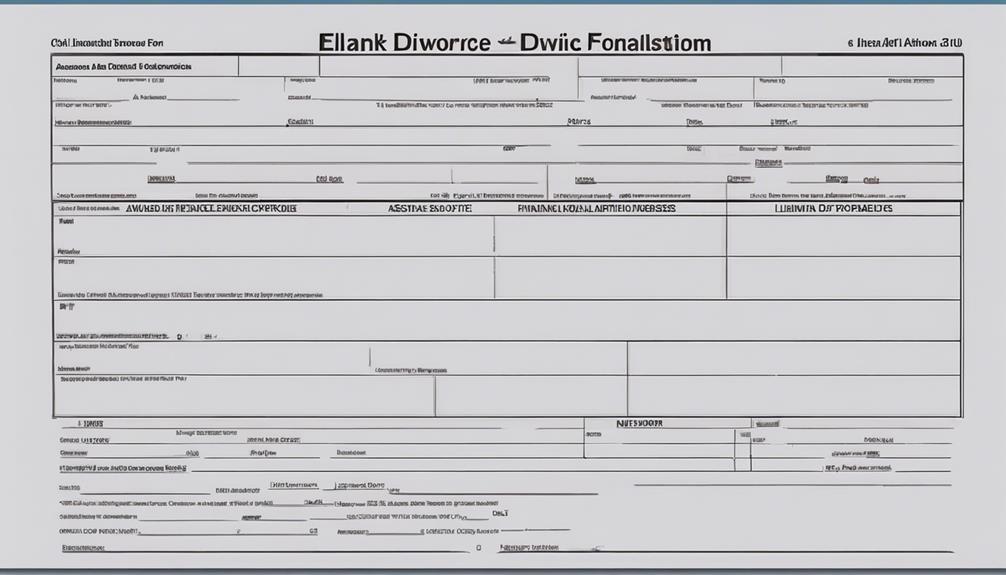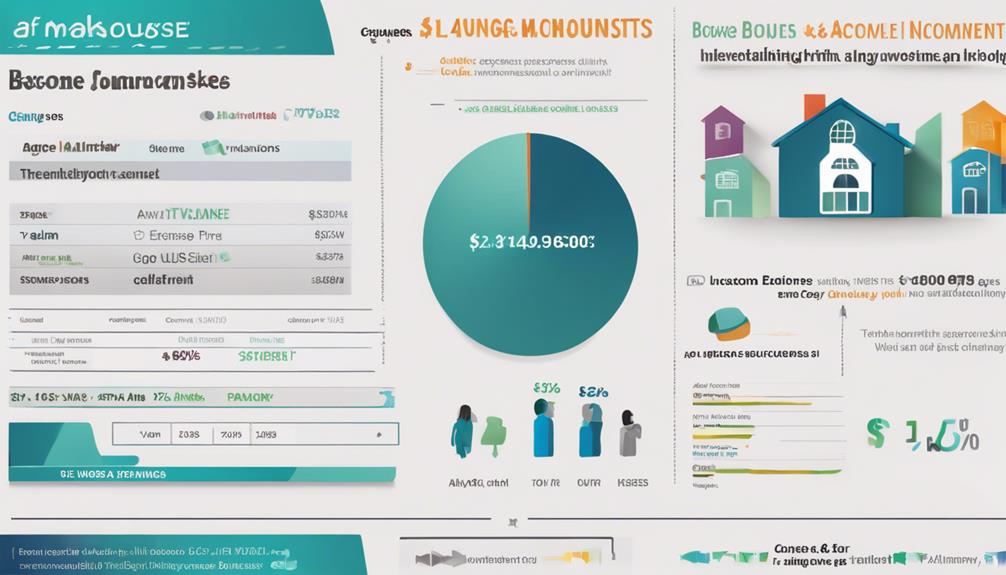Financial Aspects
What Does the Illinois Divorce Financial Affidavit Include?
Curious about the Illinois Divorce Financial Affidavit? Uncover its comprehensive components that delve deep into your financial essence.

The Illinois Divorce Financial Affidavit serves as a comprehensive glance at your finances, exposing all aspects of your earnings and outgoings in minute detail.
But what exactly does this all-encompassing document entail? Well, let's just say that it goes beyond mere numbers and figures, delving into the very core of your financial existence.
Intrigued? Stay tuned to uncover the intricate components that make up this essential piece of the divorce puzzle.
Key Takeaways
- Comprehensive summary of income, expenses, assets, and debts.
- Transparent disclosure of all owned assets and detailed financial information.
- Detailed breakdown of income sources, expenses, debts, and tax-related details.
- Legal declarations and notarization for authentication, confirming truthfulness under penalty of perjury.
Purpose of the Financial Affidavit
In our divorce proceedings, the Financial Affidavit serves the critical purpose of summarizing our income, expenses, assets, and debts. In Illinois, this document is a cornerstone of the court process, providing essential financial information that guides the division of assets and determination of support payments.
The accuracy of the information contained within the Financial Affidavit is paramount, as it directly impacts the outcome of the divorce settlement. Failure to disclose assets or income truthfully can result in severe consequences, including legal penalties and delays in finalizing the divorce. Therefore, it's crucial for both spouses to ensure that the Financial Affidavit is completed meticulously and with full transparency.
Seeking assistance from a lawyer to review the document can help guarantee its accuracy and prevent any misunderstandings that may arise during the divorce proceedings. By understanding the significance of the Financial Affidavit and the role it plays in the divorce process, both parties can navigate this challenging time with confidence and control.
Required Financial Information

To compile the Illinois Divorce Financial Affidavit accurately, spouses must provide comprehensive details regarding their income, expenses, assets, and debts.
Sources of income need to be thoroughly documented, including earnings from employment, businesses, investments, and any other revenue streams. When listing assets, spouses must include real estate, vehicles, bank accounts, retirement funds, and any other valuable possessions.
Debts such as mortgages, loans, credit card balances, and other financial obligations should be clearly outlined. Additionally, detailing monthly expenses like rent, utilities, groceries, and debt repayments is essential for a complete financial picture.
Ensuring the accuracy and completeness of this information is crucial for achieving a fair divorce settlement in Illinois court proceedings. By providing all required financial information with precision, spouses can maintain control over their divorce proceedings and contribute to a smoother resolution of financial matters.
Asset Disclosure
Disclosing all assets in the Illinois Divorce Financial Affidavit is a critical step towards ensuring a transparent and equitable property division process. When it comes to asset disclosure, parties must provide a detailed account of all assets owned, including real estate properties, investment accounts, vehicles, personal belongings, and more. It's crucial to accurately value and describe these assets to facilitate a fair property division in divorce proceedings.
Additionally, supporting documentation for the listed assets is necessary to substantiate their existence and value.
Failure to provide a comprehensive and honest disclosure of assets can have serious legal consequences and significantly impact the outcome of the divorce settlement. Therefore, it's in the best interest of all parties involved to approach asset disclosure with utmost sincerity and thoroughness.
Income and Expense Details

When ensuring a transparent and fair property division process in an Illinois divorce, a crucial aspect to address is providing detailed information about all sources of income for both spouses in the Illinois Divorce Financial Affidavit. This affidavit delves into various financial aspects, including monthly expenses, additional sources of income like investments, and a breakdown of debts and loans. It aims to create a comprehensive overview of the financial landscape, covering all financial obligations that may impact the net income of each spouse. Furthermore, the affidavit may require disclosing details about tax deductions and retirement contributions to present a clear picture of the overall financial situation. To illustrate further, here is a table summarizing the key elements covered in the Income and Expense Details section:
| Category | Details |
|---|---|
| Income Sources | Employment, investments, rental income |
| Monthly Expenses | Housing, utilities, regular costs |
| Financial Obligations | Debts, loans, other financial commitments |
Signatures and Legal Declarations
Our signatures on the Illinois divorce financial affidavit carry significant legal weight, requiring notarization for authentication and serving as a sworn declaration of the accuracy and completeness of our financial disclosures.
Parties involved must sign the affidavit under penalty of perjury, indicating that the information provided is true and complete to the best of their knowledge. Notarized signatures play a crucial role in confirming the authenticity of the financial information disclosed in the affidavit.
These signatures aren't merely formalities but rather a binding acknowledgment of the truthfulness and accuracy of the financial details provided. The legal declarations within the affidavit further emphasize the importance of ensuring the accuracy and completeness of the financial disclosures, underscoring the seriousness with which this information must be treated.
Therefore, parties must be diligent and thorough in their financial reporting to uphold the integrity and validity of the divorce financial affidavit.
Frequently Asked Questions
What Is Required on an Affidavit in Illinois?
On an affidavit in Illinois, accuracy is crucial. It must include truthful details about income, expenses, assets, and debts. Supporting documents like tax returns and bank statements are needed. Swearing truth under penalty of perjury is mandatory.
How Do I Make an Affidavit of Financial Support?
When making an affidavit of financial support, we gather income, assets, debts, and expenses, ensuring accuracy and honesty. This sworn statement, backed by financial documents, is vital in divorce proceedings for determining financial responsibilities.
What Is a Financial Affidavit Que Es?
We understand the importance of a financial affidavit. It's a sworn document detailing income, expenses, assets, and debts in an Illinois divorce. Accurate completion is crucial for fair decisions. Supporting documents validate information.
Do You Have to Fill Out a Financial Affidavit for Divorce in Florida?
Yes, we must fill out a financial affidavit for divorce in Florida. It's a critical step where both spouses disclose income, expenses, assets, and debts. Providing accurate information is crucial to ensure fair outcomes in child support, alimony, and property division.
What are the Key Differences Between the Illinois and Florida Divorce Financial Affidavits?
When going through a divorce process, it’s important to understand the key differences between the Illinois and Florida divorce financial affidavits. In Illinois, the financial affidavit requires detailed information about income, expenses, assets, and debts. In Florida, the financial affidavit follows a similar format but includes specific sections for documenting income and expenses.
Conclusion
In conclusion, the Illinois Divorce Financial Affidavit is a crucial document that must be completed accurately to avoid serious consequences. It provides a detailed summary of income, expenses, assets, and debts, necessary for the progression of divorce proceedings.
Remember, honesty is key in this process, as any false information can have detrimental effects. So, let's make sure to fill out this form with utmost care and attention, to ensure a smooth and fair resolution to the divorce.
Understanding the financial implications of divorce can be daunting. Christopher, our Financial Strategist, makes it accessible and manageable. He offers strategic insights into financial planning, asset division, and budgeting during and after divorce. Christopher’s guidance is invaluable for anyone looking to navigate the financial challenges of divorce with confidence and clarity.
Financial Aspects
Financial Investigator's Role in Divorce Cases
Solving the mystery of hidden assets, valuation disputes, and fair outcomes, financial investigators are essential players in shaping divorce settlements.

As financial detectives, we serve as the precise builders of financial transparency during the chaotic upheavals of divorce proceedings.
The intricate web of financial intricacies that we unravel can make or break the foundation of a divorce settlement.
Let's explore how these financial detectives navigate through the complex terrain of hidden assets, valuation disputes, and ensuring fair outcomes, shedding light on the critical role they play in shaping the financial landscape of divorce proceedings.
Key Takeaways
- Analyzing financial data for equitable asset division in divorces.
- Uncovering hidden assets through forensic examination.
- Expertly valuing diverse assets for fair outcomes.
- Collaborating with attorneys to strengthen legal strategies.
Importance of Financial Investigators in Divorce
Financial investigators play a critical role in divorce cases by meticulously analyzing financial data to ensure an equitable division of assets. In the realm of divorce proceedings, distinguishing between community and separate property is crucial, and financial investigators excel in this task.
By evaluating business profits, investment earnings, and other financial aspects, they facilitate a fair asset division process. These professionals delve deep into tax records and spending patterns to uncover any hidden assets that could impact the settlement.
In high-net-worth divorces, their expertise in asset valuation becomes even more paramount, helping to accurately assess the true value of complex assets. Through their comprehensive appraisals of properties, investments, and other holdings, financial investigators contribute significantly to achieving equitable settlements that satisfy all parties involved.
Their meticulous attention to detail and analytical approach ensure that the division of assets is done with precision and fairness, setting the stage for a smoother divorce process.
Uncovering Hidden Assets

When delving into divorce cases, the meticulous work of forensic accountants proves essential in uncovering hidden assets through thorough examination of financial records and transactions. Forensic accountants are trained to sift through intricate financial data, leaving no stone unturned to reveal assets that may have been concealed deliberately.
They employ various techniques, like scrutinizing bank statements and invoices, to track down hidden assets camouflaged through deceptive means such as shell companies or secret accounts. Asset tracing is a vital process used by forensic accountants to trace the origin and fluctuations in the value of assets over time. This method is crucial for ensuring a fair asset division during divorce proceedings.
Role in Asset Valuation
In asset valuation during divorce cases, forensic accountants play a crucial role in determining the accurate worth of all marital property items. They specialize in evaluating complex assets like businesses or investments, ensuring a fair division of property between the involved parties. Through their expertise, forensic accountants contribute significantly to establishing the financial settlement during divorce proceedings.
By engaging with forensic accountants, all assets undergo proper assessment and are included in the valuation process, leaving no room for oversight. This meticulous approach to asset valuation not only aids in preventing disputes but also minimizes the likelihood of dissatisfaction with the final division of property.
The involvement of forensic accountants in the valuation process adds a layer of assurance that the marital property is valued correctly, enabling a smoother and more equitable resolution of asset division in divorce cases.
Ensuring Equitable Asset Division

Transitioning from the critical role of forensic accountants in asset valuation during divorce cases, ensuring equitable asset division demands meticulous scrutiny of financial records and thorough analysis of diverse assets. Financial investigators play a pivotal role in uncovering hidden assets and income sources, ensuring a fair distribution of wealth.
By delving into financial records, tax returns, and business documents, they accurately assess the value of assets, including real estate, investments, and offshore holdings. Their expertise in business valuation is instrumental in determining spousal and child support payments by revealing undisclosed financial resources and hidden income streams.
Through advanced investigative techniques, financial investigators trace and evaluate diverse assets, contributing significantly to alimony and child support calculations. Their meticulous approach guarantees a just and equitable financial outcome post-divorce.
- Uncovering hidden assets and income sources is crucial for a fair asset division.
- Thorough analysis of financial records and business documents ensures accuracy.
- Expertise in business valuation impacts spousal and child support calculations significantly.
Collaboration With Divorce Attorneys
Through close collaboration with divorce attorneys, financial investigators strategically gather essential evidence and financial information vital for divorce cases. This partnership is instrumental in uncovering hidden assets, analyzing financial records, and providing expert testimony in court.
By working together, financial investigators and divorce attorneys ensure a comprehensive approach to financial investigation, leading to fair asset division and support payment determinations. This collaboration strengthens legal arguments and enhances the client's position in divorce proceedings, particularly in complex cases where expertise from both parties is crucial.
The combined efforts of financial investigators and divorce attorneys maximize the chances of achieving favorable outcomes for clients by utilizing a tailored approach to evidence gathering and legal strategy. In essence, this collaboration is a cornerstone in navigating the intricate landscape of divorce cases, ensuring that all financial aspects are thoroughly examined and addressed for the benefit of the client.
Frequently Asked Questions
What Is the Role of a Financial Investigator?
We analyze financial data meticulously, uncovering hidden assets and income sources. Our expertise lies in scrutinizing documents like tax returns and business records for transparency. This role is pivotal in asset valuation and fair division planning.
What Does a Forensic Accountant Do in a Divorce?
In divorce cases, forensic accountants analyze financial data, ensure accurate asset valuation, and provide expert testimony. They uncover hidden assets, promote transparency, and address complex financial matters. Their role is crucial in facilitating fair asset division.
How Much Does a PI Cost in Texas?
We've found that private investigator costs in Texas vary from $50 to $250 per hour, depending on the complexity of the task. Additional expenses like travel and equipment may also be included in the total cost.
What Skills Do You Need to Be a Financial Crime Investigator?
To excel as a financial crime investigator, one needs strong analytical skills for interpreting complex financial data, a deep understanding of financial laws, proficiency in investigation tools, attention to detail, and excellent communication skills for presenting findings effectively.
How Can a Financial Investigator Assist in Divorce Cases?
A forensic financial investigator in divorce can help uncover hidden assets, income, or financial discrepancies. By conducting a thorough analysis of financial records and transactions, they can provide valuable evidence to support their client’s case. Their expertise can be crucial in ensuring a fair and equitable division of assets during divorce proceedings.
Conclusion
In conclusion, financial investigators are the Sherlock Holmes of divorce cases, diligently uncovering hidden assets and ensuring fair asset division. Their meticulous analysis and expertise are crucial in navigating complex financial landscapes and securing just outcomes.
Like skilled detectives, they piece together financial puzzles with precision and dedication, ultimately shedding light on the truth and bringing clarity to often murky financial situations. Their role is indispensable in the pursuit of justice and equity in divorce proceedings.
Understanding the financial implications of divorce can be daunting. Christopher, our Financial Strategist, makes it accessible and manageable. He offers strategic insights into financial planning, asset division, and budgeting during and after divorce. Christopher’s guidance is invaluable for anyone looking to navigate the financial challenges of divorce with confidence and clarity.
Financial Aspects
How to Set a Financial Settlement Time Limit After Divorce
Are you curious about the consequences of not setting a financial settlement time limit after divorce? Discover the intricate process and essential factors to consider.

Let’s begin with this thought: have you ever pondered the possible repercussions of failing to set a deadline for a financial settlement after a divorce?
The process of setting such a boundary can be intricate, but it is essential for ensuring a clear and defined path forward for both parties involved.
By exploring the various factors that come into play when determining these limits, we can gain valuable insights into how to navigate this aspect of post-divorce financial management successfully.
Key Takeaways
- Establishing time limits is crucial for timely resolution and closure.
- Factors like family dynamics and legal requirements inform time limits.
- Consult with a family lawyer to draft clear agreements.
- Utilize communication strategies for mutual understanding and successful negotiation.
Importance of Setting Time Limits
Setting a financial settlement time limit after divorce is crucial for ensuring a timely resolution of financial matters and preventing potential future disputes. In property settlement proceedings, establishing a specific timeframe within which financial matters must be settled helps in avoiding prolonged uncertainty and ongoing legal battles. Without a set time limit, ex-spouses may delay negotiations or seek to reopen financial settlements, leading to extended legal disputes and financial instability.
By imposing a time limit, both parties are encouraged to engage in timely negotiations, facilitating a quicker resolution and enabling individuals to move forward with their financial plans post-divorce. This structured approach promotes closure, minimizes the risk of future claims, and allows for a smoother transition into the next chapter of each person's life.
Ultimately, setting a time limit for financial settlement post-divorce is essential in providing clarity, certainty, and a sense of finality to all parties involved.
Factors to Consider in Setting Limits

Considering the importance of timely resolution in financial matters post-divorce, it becomes imperative to assess various factors that play a significant role in determining the appropriate limits for settlement.
Firstly, the complexity of family dynamics and the intricacies of property settlement must be taken into account. Each family's situation is unique, requiring a tailored approach to establish a reasonable timeframe.
Secondly, the legal requirements for the application for property settlement should guide the decision-making process. Understanding the specific deadlines and procedures involved in property settlement applications is crucial to avoid unnecessary delays.
Additionally, the potential implications of missing the statutory time limit of 12 months after divorce for financial settlements shouldn't be underestimated. Delays can jeopardize property division rights and may impact spousal maintenance entitlements.
Seeking legal advice early on can provide clarity on these matters and help protect one's financial interests during the settlement process.
Steps to Establish a Time Limit
When establishing a time limit for reaching a financial settlement after divorce, it is crucial to carefully consider the personal circumstances and agreements to determine the desired timeframe. Consulting with a family lawyer specializing in family law can provide valuable insights into the legal requirements and options available for setting a time limit for the financial settlement. Factors such as asset division, spousal maintenance, child support, and other financial obligations should all be taken into account when establishing the time limit to ensure a fair and equitable outcome. One effective way to formalize the agreed-upon time frame is by drafting a formal agreement or consent order that explicitly states the deadline for completing the financial settlement post-divorce. This document becomes legally binding and can help prevent misunderstandings or disputes in the future. It is essential to ensure clarity and mutual understanding between parties regarding the consequences of not meeting the set time limit for financial settlement.
| Family Law ConsultationLegal Requirements for Time LimitDraft Formal Agreement | ||
|---|---|---|
| Consider Personal Circumstances | Asset Division and Financial Obligations | Ensure Clarity and Understanding |
| Consult with Family Lawyer | Spousal Maintenance and Child Support | Prevent Disputes and Misunderstandings |
Communication Strategies for Agreement

Effective communication strategies play a vital role in facilitating agreement on financial matters during the divorce settlement process. Parties involved in a divorce can benefit significantly from clear and concise discussions regarding their financial settlement agreement.
Seeking professional mediation services can provide a structured environment for constructive dialogue and help navigate complex financial issues efficiently. Utilizing written proposals and documentation can assist in clarifying terms and ensuring mutual understanding between both parties.
Regular updates and follow-ups on negotiations are essential to maintain momentum towards reaching a timely financial settlement.
Consequences of Not Setting a Time Limit
Failing to establish a time limit for financial settlement post-divorce can result in prolonged uncertainty and potential financial risks, leading to disputes over assets, liabilities, and ongoing financial responsibilities. Without a clear deadline, ex-spouses may procrastinate or avoid finalizing the financial aspects of their divorce, which can lead to increased stress and legal complications. This lack of clarity can also impact financial planning, property division, and overall stability after divorce. Moreover, not setting a time limit can hinder the closure needed to move forward with financial independence. To illustrate the consequences further, consider the following table:
| Consequences of Not Setting a Time Limit | ||
|---|---|---|
| Prolonged Uncertainty | Potential Financial Risks | Disputes Over Assets |
| Disputes Over Liabilities | Ongoing Financial Responsibilities |
In essence, failing to establish a time limit for financial settlement post-divorce can have detrimental effects on both parties, potentially leading to court involvement and prolonged legal proceedings.
Frequently Asked Questions
Who Is Better off Financially After Divorce?
After divorce, financial outcomes vary depending on factors like earning potential, assets, and agreements made during marriage. The spouse with higher income or assets may fare better financially. Seeking legal advice is vital for a fair settlement.
How Do I Manage My Finances After Divorce?
After divorce, we manage finances by creating a budget, seeking financial advice, updating accounts, understanding obligations, and keeping records. These steps ensure financial stability and legal compliance. It's crucial to stay organized and proactive in managing post-divorce finances.
Is There a Statute of Limitations on Divorce Settlements in Texas?
In Texas, no specific statute of limitations for divorce settlements exists. Parties can negotiate financial matters post-divorce without time constraints. If no agreement is reached, court intervention may be needed. Seeking legal advice is recommended.
Can Ex Wife Claim Inheritance After Divorce?
We can't predict if your ex-wife can claim inheritance post-divorce. Legal advice is crucial. Inheritance's treatment varies. Seek guidance from a family lawyer. Understand the nuances. Protect your assets. Your future matters.
What is the Process for Setting a Time Limit for Financial Settlement After Divorce?
When going through a divorce, it’s essential to adhere to financial settlement time limits. The process for setting a time limit for financial settlement after divorce involves legally filing for the settlement within the specified timeframe. It’s crucial to consult with a lawyer to ensure all deadlines are met.
Conclusion
In conclusion, it's essential to set a financial settlement time limit after divorce to avoid future complications and protect your assets.
For example, a couple who didn't establish a time limit faced a legal battle years later when one party tried to claim a portion of the other's inheritance.
By proactively setting a time limit and resolving financial issues promptly, you can ensure a smoother transition post-divorce and safeguard your financial interests.
Understanding the financial implications of divorce can be daunting. Christopher, our Financial Strategist, makes it accessible and manageable. He offers strategic insights into financial planning, asset division, and budgeting during and after divorce. Christopher’s guidance is invaluable for anyone looking to navigate the financial challenges of divorce with confidence and clarity.
Financial Aspects
Getting a Divorce on Paper for Financial Reasons: A Step-by-Step Guide
Stirring up curiosity, discover the surprising benefits and strategic steps involved in getting a divorce on paper for financial reasons.

As we make our way through the intricacies of contemporary living, occasionally unforeseen resolutions emerge to tackle monetary difficulties. When delving into the idea of pursuing a legal separation for fiscal motivations, we discover a strategy that could provide distinctive benefits.
By carefully considering the intricacies of this process, individuals can potentially unlock opportunities for financial optimization and security. Let's delve into the initial steps and considerations involved in this intriguing approach to managing financial affairs.
Key Takeaways
- Evaluate tax planning and asset division strategies for financial benefits.
- Ensure proper documentation and accurate financial data presentation.
- Safeguard investments and possessions with structured budgeting.
- Seek professional assistance from financial planners and CDFA for optimal outcomes.
Reasons for Financial Divorce
When considering the reasons for financial divorce, it's essential to evaluate the potential benefits and drawbacks that such a decision may entail. Financial divorce often involves intricate tax planning, retirement considerations, and asset division strategies.
By divorcing on paper for financial reasons, individuals seek to optimize their tax liabilities, gain eligibility for ACA subsidies, and enhance their retirement planning prospects. Understanding the healthcare implications, changes in insurance coverage, and tax consequences are critical components of the financial divorce decision-making process.
Moreover, long-term financial implications, including retirement account division and potential tax complications, play a pivotal role in shaping the financial landscape post-divorce. This strategic approach to financial divorce requires meticulous attention to detail and a comprehensive understanding of how each decision impacts one's overall financial well-being.
Legal Implications and Considerations

To fully grasp the implications of pursuing a divorce for financial reasons, one must carefully consider the legal aspects, including asset division, alimony, child support, and financial disclosure requirements. When filing for divorce, understanding the legal implications is crucial to ensure a fair and equitable outcome. Consulting a divorce attorney can provide valuable insights into navigating the complexities of asset division, determining alimony payments, establishing child support arrangements, and meeting financial disclosure requirements. Proper documentation and thorough presentation of financial data are essential for a smooth legal process. Evaluating the long-term financial impact of the divorce is key to making informed decisions that align with your financial goals. Below is a table summarizing the key legal considerations when seeking a divorce for financial reasons:
| Legal Implications | Considerations | Importance |
|---|---|---|
| Asset Division | Equitable distribution | Fair allocation |
| Alimony | Spousal support | Financial stability |
| Child Support | Dependent care | Children's well-being |
Paperwork Requirements and Process
Gathering personal and financial documentation, such as tax returns, asset details, and income information, is a crucial step in the divorce process. To ensure a smooth filing process, it's essential to complete the required forms accurately. Here are three key aspects to consider:
- Diverse Forms: Different forms are necessary based on the specifics of your case. Forms vary depending on whether children are involved, addressing crucial matters like custody, support, property division, and alimony.
- Procedural Variations: Filing procedures, fees, payment methods, and submission options can differ significantly. Adhering to the court's specific guidelines is vital to avoid delays and complications in the process.
- Service Requirements: Properly serving the Defendant with the divorce papers is a critical step. Failure to fulfill this requirement can result in setbacks and hinder the progression of your case. Ensure that all necessary steps for serving the papers are carried out diligently to maintain control over the process.
Asset Protection and Financial Planning

Safeguarding investments, real estate, and valuable possessions is a critical aspect of asset protection in divorce. Family law considerations play a significant role in determining how assets are divided during divorce proceedings. Understanding the tax implications of asset division is crucial for effective financial planning post-divorce. Retirement accounts, real estate holdings, and other assets need to be carefully evaluated to minimize tax liabilities and maximize financial gains.
Financial planning after divorce involves creating a structured budget, saving for the future, and managing assets wisely. Seeking guidance from a knowledgeable divorce lawyer or financial advisor can provide valuable insights into navigating the complexities of asset protection and financial planning. Spousal support arrangements should also be factored into long-term financial planning strategies to ensure financial stability for both parties post-divorce.
Effective asset protection and financial planning require a detailed inventory of all assets and liabilities to facilitate fair and equitable division during divorce proceedings. By proactively addressing asset protection and financial planning considerations, individuals can secure their financial well-being and plan for a stable future beyond divorce.
Professional Assistance and Resources
When navigating the complexities of divorce, seeking professional assistance from a divorce attorney can provide invaluable guidance on the intricate financial aspects involved. Here are three key resources to consider for managing your finances during a divorce:
- Financial Planner: Engaging a financial planner can help you strategize asset division and plan for your post-divorce financial future. Their expertise in financial matters can assist in maximizing your financial outcomes during and after the divorce process.
- Certified Divorce Financial Analyst (CDFA): A CDFA specializes in the financial issues surrounding divorce and can offer tailored advice on how to navigate the financial intricacies of asset division and divorce settlements effectively.
- Tax Professional: Consulting with a tax professional is crucial for understanding the tax implications of your divorce settlement. They can provide insights on tax-efficient strategies and ensure that you're well-informed about the financial implications of your decisions.
Frequently Asked Questions
Can Getting a Divorce on Paper Affect My Credit Score or Financial Standing in Any Way?
Getting a divorce on paper alone typically doesn't directly impact credit scores or financial standing. However, shared debts and assets during marriage might affect credit if not managed post-divorce. It's crucial to monitor and address these factors.
How Can a Financial Divorce Impact My Taxes and Tax Filing Status?
Tackling taxes post-financial divorce demands diligence. Divvying deductions, deciding on filing status, and discerning dependency exemptions are crucial. Seek sound advice to secure savings, sidestep surprises, and stay savvy in tax matters.
Are There Any Potential Long-Term Consequences or Drawbacks to Getting a Divorce on Paper for Financial Reasons?
While getting a divorce on paper for financial reasons may offer short-term benefits, potential long-term consequences like affecting retirement savings, social security benefits, and estate planning should be carefully considered before making such a decision.
Can I Still Access My Ex-Spouse's Retirement Benefits or Social Security Benefits After a Financial Divorce?
When considering post-financial divorce benefits like retirement or social security, it's crucial to understand the legal implications. We can navigate these complex matters effectively by seeking expert advice and ensuring our rights are protected.
Is There a Waiting Period or Specific Timeline for When a Financial Divorce Takes Effect and Is Legally Recognized?
There isn't a universal waiting period for a financial divorce to take effect; it varies by jurisdiction. It's crucial to consult legal counsel to ensure all necessary steps are followed accurately to expedite the process.
Can Getting a Divorce for Financial Reasons Help Alleviate Financial Hardship?
Getting a divorce for financial reasons may seem like a viable solution to alleviate the financial challenges of divorce. However, it’s important to consider the emotional and psychological toll it can have on individuals. Seeking financial counseling and exploring other options may be more beneficial in the long run.
Conclusion
In conclusion, divorcing for financial reasons can be a complex process that requires careful consideration and planning.
One interesting statistic to note is that according to a recent study, over 50% of divorces in the United States are at least partially motivated by financial issues.
This highlights the significant impact that financial concerns can have on relationships and the importance of understanding the process involved in getting a divorce for financial reasons.
Understanding the financial implications of divorce can be daunting. Christopher, our Financial Strategist, makes it accessible and manageable. He offers strategic insights into financial planning, asset division, and budgeting during and after divorce. Christopher’s guidance is invaluable for anyone looking to navigate the financial challenges of divorce with confidence and clarity.
-

 Navigating the Divorce Process2 months ago
Navigating the Divorce Process2 months agoNavigating the Complexity: Divorce Document Preparation Services Explained
-

 Financial Aspects2 months ago
Financial Aspects2 months agoFinancial Advisor's Guide to Navigating Divorce Finances
-

 Navigating the Divorce Process2 months ago
Navigating the Divorce Process2 months agoDivorce Lawyers New Orleans: Your Ultimate Guide to Legal Separation and Family Law
-

 Life After Divorce2 months ago
Life After Divorce2 months agoTD Jakes: Life After Divorce – A Journey of Healing
-

 Navigating the Divorce Process2 months ago
Navigating the Divorce Process2 months agoNavigating Divorce with a Muslim Divorce Lawyer
-

 Supporting Children Through Divorce2 months ago
Supporting Children Through Divorce2 months agoPositive Effects of Divorce on Children: A Guide to Understanding
-

 Directory2 months ago
Directory2 months agoCompassionate Vista Divorce Attorney | Family Law Help
-

 Navigating the Divorce Process2 months ago
Navigating the Divorce Process2 months agoUnderstanding Dominican Republic Divorce Law







































